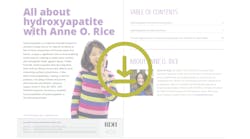For those of us who are lucky enough to live in the Deep South, winter is still hanging around and we’re not happy about it. I, for one, experience an irresistible urge to hibernate. Like bears and some other mammals, I tend to want to bed down for the winter and stay there until the spring.
A major part of my winter “snuggling” mode is to rent lots of DVDs. Last week, I rented a good one called Iron-Jawed Angels1 starring Angelica Huston and Hilary Swank. This movie is set in the early 1900s and features two defiant young women activists who literally put their lives on the line to fight for a woman’s right to vote. At one point, Hilary Swank, the lead activist, is almost ready to give up, but her mother, sensing her frustration, quickly reminds her of her commitment by saying: “You put your hand to the plow; you finish the row.
As I consider our continuing journey toward the achievement of the status of an established profession, like law or medicine, I am reminded of an address that was given by a Canadian dental hygienist who, in 1979, talked to her audience in Ontario about dental hygiene being a “semi-profession.” She went on to describe the characteristics of a “true” profession: autonomy, self-regulation, and a systematic body of knowledge. She placed particular emphasis on something else that I believe is significant to us, especially at this time in the history of our profession. She stressed the importance of a professional identity and a common destiny along with a distinctive culture.
In recent years, I have focused my attention on non-surgical periodontal therapy and evidence-based medicine/dentistry as it relates to clinical decision-making. Non-surgical periodontal therapy and patient wellness are slowly evolving and becoming a significant part of clinical dental hygiene “culture” and “identity.” I participate in several online chat groups that discuss these particular subjects and read as much literature as is humanly possible while trying to enjoy life and run a busy household. After much study and contemplation, I am convinced that periodontal diseases are holistic in nature (affecting the whole person), including links between periodontitis and some systematic, genetic, and anxiety conditions.
When I first began to search for new information about periodontal diseases that would enrich my practice experiences, many new and magical stories unfolded before me, not too different from the movie The Never Ending Story. To begin with, I learned very quickly in lectures and by chatting online with others that there is strength in numbers and an incredibly rich learning environment where participants are young and old, experienced and inexperienced. Not only did I meet clinicians who are incredibly gutsy, innovative, and passionate about non-surgical periodontal therapy, I was also introduced to a core group of dental professionals with a common destiny and unquenchable thirst for effective non-surgical, anti-infective and anti-inflammatory approaches to treating and preventing periodontal infections.
Among the many dedicated and persistent dental professionals who chat or write on a regular basis, I have observed that, collectively, they all have something in common: they are change agents working for a common cause. For example, I recently met Cheryl Thomas, RDH, who is a 1999 kidney transplant recipient. Cheryl is passionate about public speaking and writing about immunocompromised patients, and her advocacy for kidney transplant patients is based on personal experience and a keen interest in research on this particular topic.
Another individual I have had the pleasure to meet is Dr. Paul Keyes, who is sometimes called the father of anti-infective periodontal therapy. Dr. Keyes “fathered” the original concept of “microbiologically modulated periodontal therapy,” and he was the co-discoverer of the etiology of dental caries, S. Mutans. He is also known for his early advocacy of baking soda as a dentifrice. In the 1980s, Dr. Keyes wrote a lot about the antimicrobial properties of hydrogen peroxide and baking soda (called the Keyes technique). Unfortunately, this technique was called into question by the periodontal researchers at the time and has since been modified.
As practitioners whose goal is to prevent and treat early gingival and periodontal infections early and non-surgically, we must never forget the early contributions of Dr. Keyes. He is a good example of a “change agent” who, with boundless enthusiasm, believes in treating periodontal lesions non-surgically. In the long-term management of periodontal infections, many hygienists and dentists are still using microscopes to assess the periodontal pocket microflora and white blood cells in gingival crevices and pockets.
Irene Woodall was one of the most vocal and significant “change agents” in dental hygiene to advocate altering the dental hygiene mentality by promoting “grass roots” participation in continuing education in which dental hygiene clinicians learn and share ideas.
In one of her most powerful commentaries in RDH magazine, she wrote, “The change must start within each of us in order to recognize the need to build our education and thinking capacity into the foundation of clinical practice.”
How committed are readers of RDH when it comes to advocating change in the status of our beloved profession? There’s a new breed of hygienists who believe in patient-empowered therapies and a practice philosophy that focuses on patient wellness. Let’s separate ourselves from the “drill and fix ‘em” mentality and the all too familiar “scale and polish” hygienist, moving into the 21st century with an open mind and an optimistic spirit.
In future issues of RDH, I’d like to focus on the changing face of periodontal therapy and major paradigm shifts that will inevitably affect our clinical decision-making and practice philosophy. Like the “iron-jawed angels” of the early 1900s, let’s approach our professional growth in this area of clinical practice with dedication and determination.
Let’s grow together and help shape our own destiny by empowering our patients to achieve a sense of well-being and optimal health.
1 Iron-Jawed Angels recounts for a contemporary audience a key chapter in U.S. history: in this case, the struggle of suffragettes who fought for the passage of the 19th Amendment. Focusing on the two defiant women, Alice Paul (Hilary Swank) and Lucy Burns (Frances O’Connor), the film shows how these activists broke from the mainstream women’s-rights movement and created a more radical wing, daring to push the boundaries of political protest to secure women’s voting rights in 1920.
Lynne H. Slim, RDH, BSDH, MSDH, is a practicing hygienist/periodontal therapist who has more than 20 years experience in both clinical and educational settings. She is also President of Perio C Dent Inc. (Perio-Centered Dentistry), a practice management consulting firm that specializes in creating outstanding dental hygiene teams. Lynne is a member of the Speaking and Consulting Network (SCN) that was founded by Linda Miles and has won two first place journalism awards from ADHA. Lynne is also owner/moderator of a periodontal therapist yahoo group: http://yahoogroups.com/group/periotherapist.





